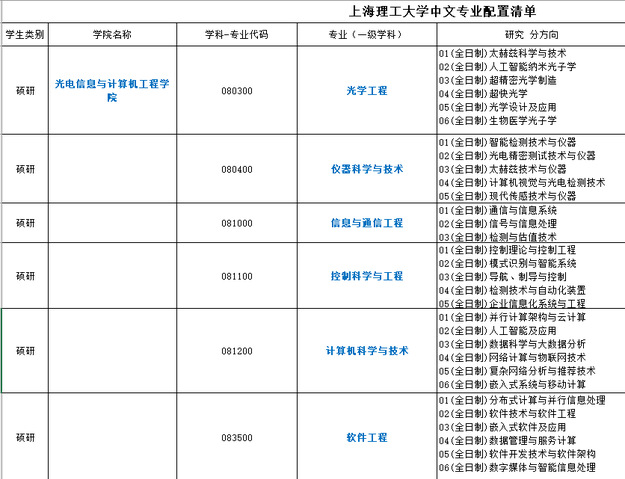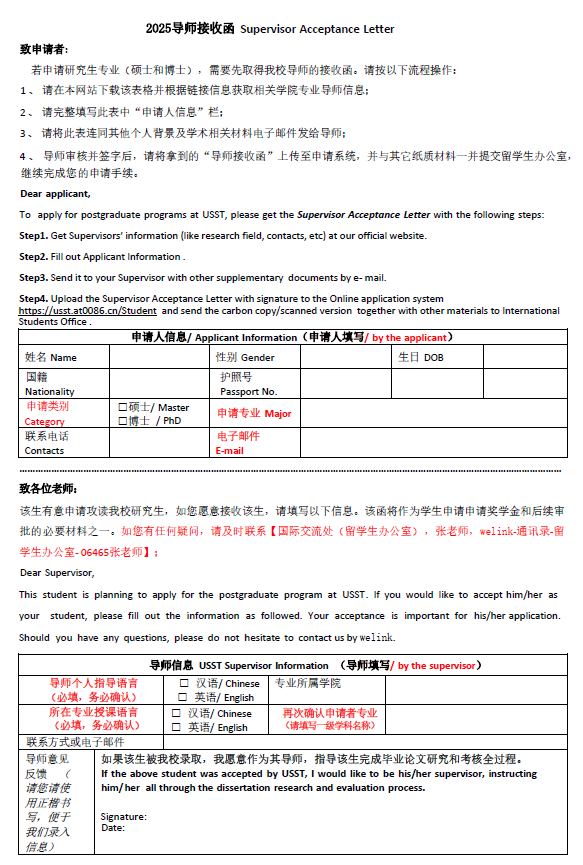
一级学科简介
Introduction to the 6 Disciplines of Master Program
at OECE
光学工程学科简介
The Introduction of Optical Engineering
光学工程学科由我国著名光学专家中国工程院庄松林院士领衔。该学科起源于1960年建立的“光学仪器”专业,1981年获硕士学位授予权,1998年获一级学科博士学位授予权,2001年被列为上海市教委重点学科,2005年列为上海市重点学科,2007年设立光学工程博士后流动站,2009年成为国家重点学科(培育),同年获得全国百篇优秀博士论文。2015年学科被批准为上海市“高峰学科”,2018年进入上海市“地方高水平大学建设”学科行列。
学科建有太赫兹波谱与影像技术省部共建协同创新中心、教育部光学仪器与系统工程研究中心、教育部医用光学仪器与设备重点实验室、上海市现代光学系统重点实验室等国家和省部级科技平台,是中国仪器仪表学会理事长单位,国家光学仪器质量监督检验中心、全国光学和光子学标准化技术委员会挂靠单位。同时还是中国光学学会工程光学专业委员会挂靠单位,中国仪器仪表学会光学仪器分会挂靠单位和中国仪器仪表行业协会光学仪器分会挂靠单位。
本学科专业拥有一支优秀的师资队伍,现有专任教师100余人,其中中国工程院院士1人,中国工程院外籍院士1人,各类国家级、省部级高层次人才30余人。具有海外留学和工作背景的教师达54%。本学科建设定位于现代光学工程的高素质人才培养和前沿性科研创新基地。学科重点建设领域为超精密光学制造、太赫兹科学与技术、光子芯片技术、纳米光子学、超快非线性光学、生物光子学等研究方向。
The discipline of Optical Engineering, led by Professor Zhuang Songlin, the famous expert in the field of optics and academician of Chinese Academy of Engineering, and Professor Gu Min, foreign academician of Chinese Academy of engineering, joins as full-time in 2019, can be traced back to the discipline of Optical Instruments established in 1960. In 1981, it was conferred the right to offer master’s degree programs. In 1998, it was conferred the right to offer doctoral degree programs. In 2001, it was listed as a key discipline of the Shanghai Municipal Education Commission. In 2005, it was listed as the key discipline of Shanghai. In 2007, the Optical Engineering Postdoctoral Research Station was set-up. In 2009, the discipline was listed as the National Key Discipline (cultivating stage). In the same year, one of the doctoral dissertations of the discipline won the award of the Top 100 National Excellent Doctoral Dissertations. In 2015, Optical Engineering was approved as “the Peak Discipline” of Shanghai and was rated as excellent in the “Peak Discipline” accreditation in 2017. In 2018, It was included in the list of disciplines for “Local High-level University Construction” in Shanghai.
The discipline is equipped with the innovation center of Terahertz spectroscopy and imaging technology, jointly built by Province and Ministry, the Optical Instruments and System Engineering Center of Ministry of Education, the Key Laboratory of medical optical equipment and devices of Ministry of Education, the Shanghai Key Laboratory of Modern Optical System and other national, provincial and ministerial technological platform, etc. It is the President Unit of China Instrument and Control Society, and the affiliated institution of the China National Center for Quality Supervision and Test of Optical Instrument, the National Standardization of Optics and Photonics Committee, the Committee of Engineering Optics of Chinese Optical Society, the Optical Instrument Branch of China Instrument and Control Society and the China Instruments Manufactures Association. The discipline owns an outstanding faculty team in which there are 100 teachers, including 1 academician from Chinese academy of engineering and 1 foreigner academician from Chinese Academy of Engineering, about 30 talents at a national or provincial and ministerial level. Those teachers who have studied abroad account for 54% of the total. The construction of the discipline aims to develop high-quality talents and leading innovation research bases for Optical Engineering. The discipline puts focus on the ultra-precision optical manufacturing, terahertz sciences and technology, photonic chip technology, nano-photonics, ultrafast nonlinear optics and bio-photonics and so on.
仪器科学与技术、信息与通信工程学科简介
The introduction of Instrument Sciences & Technology and Information & Communication Engineering
仪器科学与技术、信息与通信工程学科在微纳米精密测试技术与装置、工业光电在线检测技术与装置、测试信号获取与处理、图像信息处理、光通信基础器件制造技术、信息传输技术、无线通信和信息安全等研究方向形成优势与特色。所聚焦的研究内容,既为上海市信息化建设、先进制造技术与装备等支柱产业发展所需,也是国家工业发展与国防建设不可缺少的相关技术。测试与信息工程系承担了国家重点研发计划、国家重大科研仪器设备研发专项、国家自然科学基金、上海市重大项目等科研项目。近三年在《Nature》子刊Nature Communications, Nature-Light: Science & Applications、Lab on a Chip、IEEE TIP、IEEE TIFS、IEEE TMM、IEEE TCSVT等国际一流学术期刊发表高水平论文120余篇,申请国家发明专利50余项。
Instrument Sciences & Technology and Information & Communication Engineering had formed advantages and characteristics in the field of micro nano precision testing technology and devices, industrial optoelectronic online detection technology and devices, test signal acquisition and processing, image information processing, optical communication basic device manufacturing technology, information transmission technology, wireless communication and information security and other research directions. What they focus on are not only what Shanghai pillar industries like Information Construction, Advanced Manufacturing Technology and Equipment need, but they are also indispensably relevant technologies of national industry development and national defense construction. Testing and Information Engineering bears key R&D projects like national key R&D plans, national R&D of key devices for scientific research, National Natural Science Foundation and Shanghai key projects. In recent 3 years more than 120 dissertations have been published in the sub-issues of Nature like Nature Communications, Nature-Light: Science & Applications、Lab on a Chip、IEEE TIP、IEEE TIFS、IEEE TMM、IEEE TCSVT and other international first-class academic journals, having applied over 50 national invention patents.
控制科学与工程学科简介
The introduction of Control Sciences and Engineering
控制科学与工程学科2006年获批一级学科硕士授权点,2016年获批一级学科博士授予权以及系统工程与仿真国防特色学科。经过多年的发展,已经建立起一支实力雄厚的高水平师资队伍,拥有欧洲科学院院士、德国国家科学与工程院院士、新世纪创新人才计划等国家级、省部级人才10余人,博士研究生导师20余人。学科与上海工业自动化仪表研究院共同创建“工业过程自动化国家工程研究中心”,还建有“上海市光电系统智能控制重点实验室“、”智能仪表与工业自动化协同创新中心“等国家级、省部级科研平台。学科依托光电信息与计算机工程学院,聚焦国家重大战略,瞄准行业需要,注重交叉融合,已经形成了复杂控制系统控制理论与工程、智能计算与网络化系统、模式识别与智能系统等稳定的研究方向,在网络化系统的控制与滤波、智能机器人、能源调度、人机交互与情感计算、医学图像处理、工业大数据等领域开展了一系列前沿科学研究。近五年来,承担或合作承担国家科技部重点研发计划、国家自然基金重点项目、国家自然科学基金面上项目等纵向课题60余项; 在国际著名IEEE汇刊、Automatica上发表相关研究成果200余篇,其中控制类顶级期刊IEEE自动控制汇刊和Automatica论文 20余篇。学科曾获吴文俊人工智能科技进步一等奖、教育部自然科学一等奖、北京市自然科学奖二等奖各一项。
Control Sciences and Engineering was approved as a first level discipline master's authorization point in 2006 and was conferred to offer a first level doctor’s program and became the Systems Engineering and Simulation Discipline with National Defense Characteristics. Having developed for many years, a high level teaching faculty team with strong power had been built, which includes academicians of Academia Europaea and German National Academy of Sciences and Engineering, about 10 national, provincial and ministerial talents affiliated to New Century Innovative Talent Plan, and more than 20 doctoral tutors. The discipline and Shanghai Industrial Automation Instrument Research Institute jointly built national, provincial and ministerial R&D platform such as National Engineering Research Center for Industrial Process Automation, Shanghai Key Laboratory of Optoelectronic System Intelligent Control and Collaborative Innovation Center for Intelligent Instruments and Industrial Automation. The discipline has formed a stable research direction to Control Theory and Engineering of Complex Control Systems, Intelligent computing and networked systems and Pattern Recognition and Intelligent System by relying on the School of Optical-Electronical and Computer Engineering, focusing on national key strategies, aiming at industrial needs and paying attention to inter-fusion and has started a series of pioneer scientific research in the field of Control and Filtering of Networked Systems, Intelligent Robot, Energy Scheduling, Human Computer Interaction and Emotional Computing, Medical Image Processing and Industrial Big Data. In recent 5 years, it has born or cooperated with others to bear national key R&D plans of Ministry of Science and Technology of China and key projects of National Natural Science Foundation of China and other 60 vertical topics, having published more than 200 resource achievements in internationally famous issues like IEEE and Automatica, including 20 dissertations in the top issue of Control, IEEE and Automatica. The discipline once won the first prize of Wu Junwen Artificial Intelligence Prize, the first prize of Natural Science of the Ministry of Education and the second prize of Natural Science of Beijing.
计算机科学与工程、软件工程学科简介
The introduction of Computer Sciences and Engineering and Software Engineering.
计算机科学与工程系有计算机科学与技术、数据科学与大数据技术两个本科专业,计算机科学与技术和软件工程两个一级学术硕士点,计算机技术专业硕士点。计算机科学与技术本科专业2019年通过德国ASIIN 认证,2022年获批国家级一流本科专业建设点。计算机科学与技术学科在第四轮学科评估获得C+,并进入ESI全球排名1%。
学科拥有高素质的师资队伍,包括教授 5 人,副教授 15 人,博士生导师 4 人,兼职导师 37 人。教师担任IEEE会员,ACM会员,中国计算机学会高级会员、专委会委员,科技部科研项目评审专家,重要学术期刊审稿专家及重要学术会议程序委员等。研究方向对接国家战略需求,包括并行计算架构与云计算、人工智能及应用 、网络计算与物联网技术、边缘计算技术、大数据分析与机器学习及软件工程方法与技术等。
近年来,学科获得多项上海市科学技术奖、机械工业委员会科技进步奖等省部级奖项;获得国家自然科学基金、教育部博导基金、国家重点开发计划、上海市重点科技项目、上海教委项目等数十项;与管网、电信、石油、交通、安防、大数据、工业控制、物联网等多个行业建立了产学研合作,与国家管网集团、航天卫星公司、公安部、上海巴士、同济大学、中科院等单位签订横向课题,经费达 2000多万元。拥有上海教委工程中心“上海智能家居大规模物联共性技术工程中心”、网络计算、物联网、大数据处理、工业控制等十多个实验室,实验室面积 1500 平方米。
Computer Sciences and Engineering includes 2 undergraduate majors: Computer Sciences & Technology and Data Sciences and Big Data, 2 first-level academic master's programs: computer Science and Technology and Software Engineering, 1 Professional master’s program: Computer Technology. The undergraduate major Computer Sciences & Technology pass ASIIN in 2019 and was approved as the national first-class undergraduate major program in 2022. Computer Science & Technology acquired C+ in the 4th discipline ranking and entered the top 1% of the world.
The discipline is equipped with High quality teaching faculty, including 5 professors, 15 associate professors, 4 doctoral tutors and 37 part-time tutors. Some teachers are members of IEEE, ACM, senior members of the Chinese Computer Society and Special Committee members and experts for evaluating and supervising of scientific projects of Ministry of Science and key academic journals and procedural committee member of key academic conferences. The research direction serves national strategical needs, including Parallel computing architecture and cloud computing, artificial intelligence and applications, network computing and Internet of Things technology, edge computing technology, big data analysis and machine learning, and software engineering methods and technologies.
In recent years, the discipline has won several provincial and ministerial prizes such as Shanghai Science and Technology Award and Machinery Industry Commission Science and Technology Progress Award, gaining several projects like National Natural Science Foundation of China, Doctoral Guidance Fund of the Ministry of Education, National Key Development Plan, Shanghai Key Science and Technology Projects, and Shanghai Education Commission Projects, cooperating in producing, studying and researching with several fields like Pipeline network, telecommunications, petroleum, transportation, security, big data, industrial control and IoT and signing horizontal topics with National Pipeline Network Group, Aerospace Satellite Corporation, Ministry of Public Security, Shanghai Bus, Tongji University and Chinese Academy of Sciences, with more than 20 million in funds. It has more than 10 laboratories for network computing, Internet of things, big data processing, industrial control and “Shanghai Smart Home Large Scale IoT Common Technology Engineering Center” affiliated to Shanghai Education Commission Engineering Center, which are up to 1500 square meters.
【OECE光电学院 导师信息】
光电信息与计算机工程学院:
https://oece.usst.edu.cn/sssds/list.htm (硕士)
https://oece.usst.edu.cn/bssds/list.htm (博士)
NB.
官方《导师接收函》模板下载(2025年):
![]() Supervisor Acceptance Letter(USST)2025.pdf
Supervisor Acceptance Letter(USST)2025.pdf
致2025申请者:
若申请研究生专业(硕士和博士),需要先取得导师的接收函。请按以下流程操作:
1、请在iso.usst.edu.cn 网站上下载该表格并根据链接信息获取相关学院专业导师信息;
2、请完整填写此表中“申请人信息”栏;
3、请将此表连同其他个人背景材料电子邮件发给导师;
4、“导师信息”栏务必填写完整,如导师联系方式、授课语言,必填!导师签字后,请将“导师接收函”上传至申请系统,并与其它纸质材料一并提交留学生办公室,继续完成您的申请手续。
致各位老师:
该生有意申请攻读我校研究生,如您愿意接收该生,请:
1)填写以上《导师接收函》,填写细节并签名后直接回传(扫描)给申请者,由申请者自行在“留学上海”填报上传。
2)“导师信息”栏务必填写完整,如导师联系方式、授课语言、专业授课语言,必填。
3)务必确认核对申请者专业,所填专业应为“一级学科”专业名称。
该函将作为学生申请入学和申请奖学金的重要材料。
如您有任何疑问,请及时Welink联系【国际交流处(留学生办公室),张老师,welink-通讯录-留学生办公室- 06465张老师】


